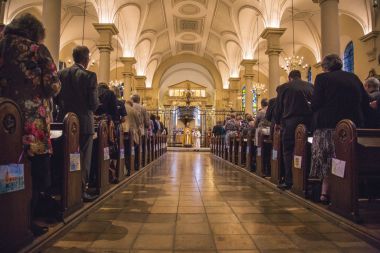'Saving the parish' and church planting must go hand in hand - Archbishop

The Archbishop of Canterbury, Justin Welby, has tried to reconcile Anglican 'save the parish' traditionalists and ambitious church planters at the new General Synod meeting this week.
In his presidential address, he told members of the Church of England's legislative body, "To save the parish does not mean to stop church planting. To church plant does not mean abandoning the parish. Far from it.
"If we take either of those binary decisions we will lose all of them. We will fail completely in every respect."
General Synod is meeting at Church House, Westminster, this week for its new five-year term after October's record-turnout elections.
Archbishop Welby pointed out that the number of regular churchgoers "has shrunk in absolute terms every year since around 1952", as he appealed to Synod members to embrace change.
"As a percentage of the population of England, the Church of England was at its high point, when there were accurate records, in the 1851 census when we were about 20 per cent of the population, roughly a couple of percentage points less than what were then called the non-Conformist churches.
"We are today around about a little less than two per cent of the population," he said.
He continued: "Institutionally, in the intervening years since 1851, we have gone through waves of change. And while we are currently in the midst of such a wave, and this Synod will be crucial in how we ride that wave and how we are shaped by it, in each one there has been a fear that we would lose our tradition, our history, our past.
"But change is not, must not be, cannot be, should not be, will not be, abandonment of our past."
Archbishop Welby also issued a statement about the recent controversy over the Anglican Church in Ghana's stance on its government's anti-LGBT bill.
"While not condoning same-sex marriage, the Anglican Church in Ghana does not condone the criminalisation of the LGBTQ+ community," he said.
After his statement, LGBT activists on Synod including Jayne Ozanne stood up waving rainbow flags and wearing signs around their necks saying 'Soon to be imprisonable in Ghana'.
Questions from Synod members reflected the deep divisions in the CofE over sexual morality. Members submitted written questions in advance of the sessions on Tuesday and Wednesday but had an opportunity to put supplementary questions in person on Tuesday evening.
Philip Baldwin, a lay member from London Diocese, asked the Bishop of London, Dame Sarah Mullally, who is leading the CofE's current Living in Love and Faith consultation on marriage, sexuality and gender:
"Please can you outline what measures are in place to safeguard LGBTQ+ people engaged with the Living in Love and Faith process, including in relation to abuse directed to Synod members?"
Bishop Mullally replied in a written answer: "It is unacceptable for people to be abused as a result of engaging with Living in Love and Faith."
Safeguarding measures included "support through LLF chaplains in many dioceses" and "the LLF Enabling Officer, who can be contacted, especially regarding abuse targeted at Synod members," Bishop Mullally wrote.
Synod members are meeting in person for the first time since the start of the Covid pandemic.
In other business, they overwhelmingly passed a motion moved by the Bishop of Sheffield, Dr Pete Wilcox, setting out "to give dioceses more freedom to be generous with their historic wealth to other dioceses in the Church of England, and in this way enable a more equitable sharing of this wealth".
It is hoped that the measure will help to ensure the survival of struggling parishes.











